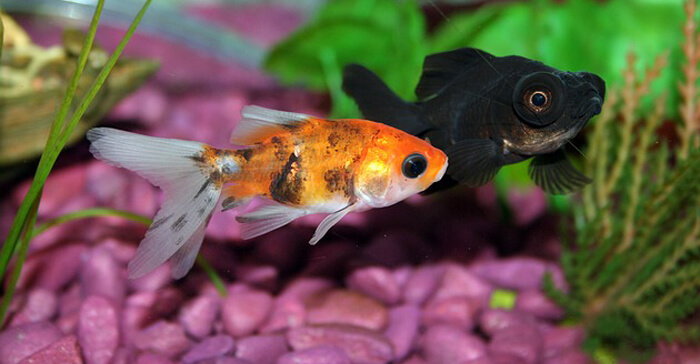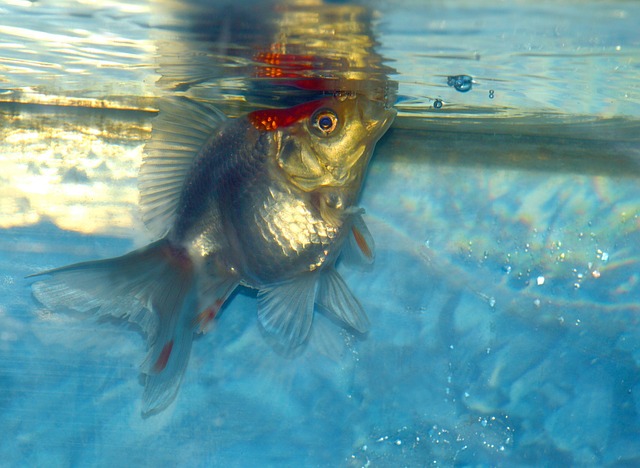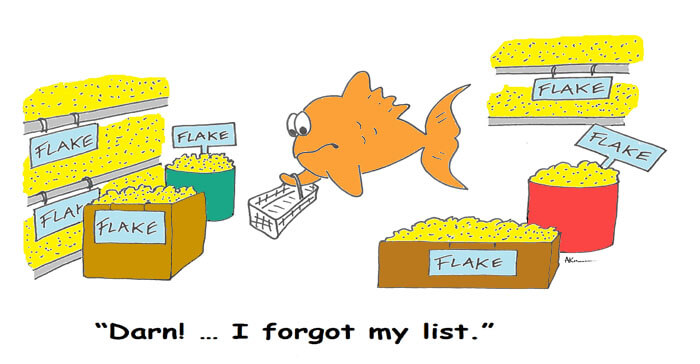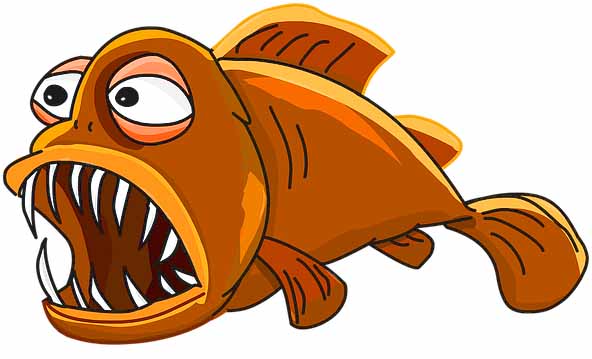As pet owners, there is nothing that we would love more than to be able to speak with our pets and understand what they need.

Imagine how helpful it would be to know that your dog needs to go outside or your cat needs to go to the vet simply by having them tell you!
Unfortunately for us, our pets cannot speak to us. However, we can observe them and try to understand their behaviors and what they mean.
Throughout this article, we will take a look at various types of goldfish behaviors and figure out what they mean so that we may better understand their needs and wants.
When goldfish chase each other
When goldfish chase each other, it can be a sign of one of two things.
The first potential meaning behind this behavior is that the fish are courting each other or attempting to mate. If this is indeed the cause for the chasing behavior, then you may not have anything to worry about. This is not a sign of aggression, fighting or bullying.
Goldfish are typically very docile and are not likely to fight or bully other fish.
However, bullying and fighting may occur if the fish are under stress (which is the second potential reason behind this behavior).
For example, if they are not being fed properly or are overcrowded then they may begin chasing and nipping at each other.
If this seems to be the cause of the chasing behavior, then the fish will need to be separated, and the underlying cause (overcrowding, lack of food, etc.) will need to be addressed.
Owners that do not address the underlying issue should expect to find their goldfish becoming severely ill and dying.
When goldfish sit on the bottom of the tank
Goldfish that sit on the bottom of the tank is another behavior that may have an innocent explanation.

For example, if your goldfish has been swimming and active for the majority of the day and seems to be taking a rest at the bottom of the tank then he may be just resting or sleeping.
However, if you have noticed that your fish has not been active throughout the course of the day and that he is experiencing excessive lethargy, then you may have a sick goldfish on your hands.
In this case, it usually means that your aquarium has not been cleaned recently, it has not undergone a water change, or the filtration system is not working properly.
The filtration system should have the proper mechanisms to maintain the chemical hazards in the tank water, the biological (algae) hazards, as well as the mechanical hazards (physical debris) that could be floating in the water.
If the filtration system does not maintain all three aspects of water filtration or, if the device is simply not working properly then, this issue will need to be corrected.
However, if your filtration system seems to be working just fine, then you may want to consider performing a 30% water change or cleaning the aquarium.
These options will help provide fresh oxygen filled water to the tank as well as remove any pollutants that may have built up to cause your fish to become ill and sit on the bottom of the tank.
When goldfish stay on the top of the water’s surface
This may be one of those “self-explanatory” behaviors to many goldfish owners.

Usually, when a goldfish is floating on the water’s surface, it is a good indicator that he has died or that he is close to it.
Goldfish tend to swim through the entirety of their tank, ranging from the surface to the gravel.
However, it is when you notice that your fish is spending a lot of time near the surface that you may want to take notice.
A goldfish that is spending extensive time at the surface and appears to be struggling, gasping or in distress in any way may be having a hard time breathing.
Goldfish breathe the oxygen found in the tank water. If the oxygen levels are low, then he will need to swim to the water’s surface where the oxygen levels may be higher.
Recommended: EcoPlus Round Air Stone
To prevent this from occurring, or to fix an existing problem, try performing a water test. You should be testing your tank water regularly, but if your fish is having a hard time breathing, then you may have missed a reading or two.
Check the water for nitrite levels, nitrate levels, ammonia, salinity and pH levels.
If any of these water tests come back in an undesirable range, then you will need to take the proper steps to fixing it.
This will include a 30% water change, checking the filtration system and various other tests.
Overcrowding an aquarium, missing water tests, and changes, lack of aeration as well as improper water temperature can all be contributors and causes for your fish not getting enough oxygen from his water.
When goldfish forage
You may be noticing your goldfish digging up his aquatic plants, pushing his ornaments around, or digging into the gravel at the bottom of his tank. These behaviors are known as goldfish foraging.

Goldfish may be seen foraging quite often, and this is entirely normal behavior. Goldfish are munchers and enjoy snacks between meals.
If you do not provide him with goldfish treats, then he is likely to try to find it around his tank. Treats in his tank may include nibbling on his aquatic plants, digging up the plants to gnaw at the roots, and sometimes even munching on algae.
Foraging is not necessarily a behavior to worry about with goldfish. It is simply in their nature. However, you should be concerned if your fish are foraging instead of eating the food you provide.
You should also be concerned if your goldfish are foraging immediately after feeding time.
These issues may arise if you are providing a fish food that is not pleasing to the fish (so they avoid eating it all together) or, you are not proving enough fish food during feeding (so they are still hungry).
Goldfish tend to be hungry quite often throughout the course of the day because they digest their food and release it at a rapid pace.
However, you should not provide an abundance of food during a single feeding. Always provide the proper amount of fish food at the appropriate times of the day.
An automatic fish feeder can be a life save for feeding the same amout at the same times everyday.
Recommended: Eheim Everyday Fish Feeder Food Dispenser
Your fish can forage for snacks if he cannot wait for his next meal to eat again.
When goldfish are aggressive
Goldfish aggression was discussed earlier in this article when explaining why goldfish may chase each other. In that section, we discovered that goldfish are typically very docile creatures that are rarely aggressive.

When they are aggressive, they are usually under stress, competing for food, or chasing down a mate.
Aggressive goldfish are also often suffering from an illness or a disease that causes them stress. This stress, sickness or disease may have been caused by poor water quality, inappropriate living conditions (overpopulating an aquarium), or even the development of parasites in the tank.
Water quality can be easily improved by testing the water and performing a water change and tank cleaning. You should also make sure that your filtration system is working properly.
If you have too many goldfish living in an aquarium, then you will need to provide a larger tank for all of them to fit into together or separate them into different tanks.
For example, if you have ten goldfish and they are sharing a 50-gallon aquarium then you will either need to purchase a 300-gallon aquarium (minimum). This is because goldfish should have at least 30-gallons of water per fish.
If you cannot afford a 300-gallon aquarium, then you will need to divide the fish up into multiple smaller aquariums (be sure to follow the 30-gallon per fish rule of thumb).
If parasites in the tank have made your goldfish ill and aggressive, then you will need to treat the aquarium water with a parasite medication that will kill them and stop their eggs from hatching and continuing the cycle.

Aggressive or sick goldfish should also be removed from the main aquarium and quarantined until the problem is resolved.
When goldfish swim quickly to the top of the tank
This is yet another behavior that could happen for multiple reasons. The first reason that your goldfish is swimming to the top of the tank could be that there is not sufficient oxygen in the aquarium.
This issue was discussed earlier in the article when explaining why a goldfish might stay at the water’s surface.

Goldfish require their water to contain quality oxygen levels in order for them to breathe well.
If the water does not provide adequate oxygen, then the fish may search the water’s surface for oxygen in an attempt to continue breathing.
This should be corrected by providing a larger tank for the goldfish to reside in, performing a water change and making sure that the filtration system is working properly.
Also, perform a water test to check for excessive ammonia, nitrite, and nitrate levels.
The other possible reason for your goldfish to rush to the top of the tank could be that he is anticipating feeding time. Goldfish are incredibly intelligent creatures. In fact, they are more intelligent than we give them credit for.
They are capable of telling time, completing simple math problems, learning tricks, and remembering their tankmates and human family members.
Your goldfish may simply be swimming to the top to greet you and welcome any treats or fish food that you may have to offer him.
If your goldfish does not appear to be in distress, gasping, or struggling in any way and he is demonstrating excitement, then it may be safe to assume that he is simply happy to see you!
Goldfish are fascinating and mysterious creatures. They are intelligent, delicate, yet hardy and strong beings that require our constant care.
You can often seem them playing, chasing, feeding, foraging, napping, and swimming together as friends in a group.
These behaviors typically represent a happy and healthy goldfish tank.
However, behaviors such as lethargy, stillness, swimming upside down, scratching against objects in the tank, or gasping for air at the water’s surface typically demonstrate a goldfish that is suffering from an illness or disease.
Observation can mean the difference between life and death for your goldfish.
Do you know of any other behavior your goldfish has displayed that we haven’t mentioned. Please comment it below.


Hi we have a small pond outside and about 6 fish. The group seem to be chasing the biggest fish and trying to flip it out of the pond? Is this usual? Why might this be?
My outside pond fish are picking on the largest fish and trying to flip it out of the pond